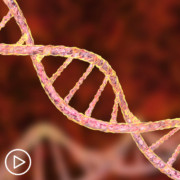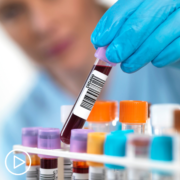How Genetic Mutations Affect Metastatic Breast Cancer Prognosis and Treatment
How Genetic Mutations Affect Metastatic Breast Cancer Disease Progression and Prognosis from Patient Empowerment Network on Vimeo.
Dr. Julie Gralow explains the impact of genetic mutations on metastatic breast cancer progression and prognosis, including how DNA repair genes function.
Dr. Julie Gralow is the Jill Bennett Endowed Professor of Breast Medical Oncology at the University of Washington, Fred Hutchinson Cancer Research Center, and the Seattle Cancer Care Alliance. More about this expert here.
See More From INSIST! Metastatic Breast Cancer
Related Resources:

|

What Are Essential Genetic Tests for Metastatic Breast Cancer Patients? |

|
Transcript:
Katherine:
You’ve been referring to a number of terms. Patients may have heard the BRCA or “braca” that relate to breast cancer in genetics. Would you give us an overview of common mutations in breast cancer?
Dr. Gralow:
So, of the mutations that we can inherit, the first two that were discovered were BRCA1 and BRCA2, and for all breast cancer – not just metastatic, but all breast cancer – we think that maybe 5-10% of breast cancer is the direct result of the inheritance of a strong gene that gives you a high – not 100%, but a high likelihood of developing breast cancer.
So, for BRCA1 and 2, these two genes are associated predominantly with breast and ovarian cancer, and if you live out your normal lifespan, you could have up to a 75-80% chance of getting one of those two cancers, and breast cancer being more common. Also, some association with some other cancers including, interestingly, prostate cancer, which we’re learning more about.
So, BRCA1 and 2 are the most common, and they tend to be found – because they have such a high association with the risk of breast and ovarian cancer, they tend to be found in families that have a lot of other breast cancers, and also breast and ovarian cancer presenting at a younger age. So, you’ve inherited a gene that leads to a high predisposition, and the cancer occurs earlier.
So, whereas the average age of diagnosis of breast cancer in the U.S. is 61-62 most commonly, in a patient who’s inherited a BRCA1 or 2 gene mutation, it’s closer to 40-42 – so, a lot younger. And then, there are a variety of other genes that can be inherited that are either much less common or have a weaker link. So, for example, there are genes called CHEK2 or PALB2, ATM, P53 – I just mention that because some of the listeners will potentially have one of those mutations or have heard it. Those are either rarer or they’re associated with a weaker chance of getting cancer.
So, those might be more commonly found in a family that doesn’t have a lot of cancer in it because a carrier – the mother or the father – and their other relatives would have maybe only a 30% chance of getting breast cancer in some cases. So, there would be a lot of carriers who don’t get cancer.
So, as I mentioned earlier, I think it’s really important – especially right now in metastatic breast cancer – that pretty much everybody, even if you didn’t have a strong family history, even if you weren’t diagnosed at a young age, get tested because if we find one of these inherited mutations, we now have some additional treatment options, especially right now, approved for BRCA1 or 2, but clinical trials going on for many of these other genes.
Katherine:
How do these mutations affect disease progression and prognosis?
Dr. Gralow:
So, most of the genes I’ve mentioned – in their normal state, they’re critical, actually. They’re called DNA repair genes, and their job in our life is when we accidentally make a mistake when we’re replicating our DNA and two cells are dividing, if there’s a mistake in the DNA, they go in and repair it. And, we’ve got all kinds of mechanisms to try to prevent mutations from happening as cells divide, and BRCA1 and 2 are a key part of that, and so, they’re fixing it.
So, if you inherit a mutation in one of those genes, you still have some ability to repair any routine mistakes that are being made, but over time, you have less ability, and then, if you get a cancer that has a deficiency in BRCA1 or 2, those cancers can be more sensitive to certain kinds of chemotherapy that affects DNA repair.
So, for example a class of chemotherapy agents called the platinum drugs – carboplatin and cisplatin – may be more effective in BRCA1- or 2-mutated cancers, also more generally in triple negative breast cancer because they can be more similar to BRCA1-mutated cancers in a lot of ways.
So, to go back to your original question, once a cancer has developed in a patient who has a BRCA1 or 2 mutation, we treat that cancer for what it is. So, it might have developed estrogen – have estrogen receptor on the surface or HER2, so we treat it as the subtype that developed, and actually, the chance of cure is just the same for BRCA1-associated breast cancer as it would be for one that doesn’t have a BRCA.
But, the chance of getting a second breast cancer – a totally new breast cancer – would be higher unless you chose to remove both of your breasts and the bulk of your breast tissue. So, decisions like surgery – if you had a known BRCA1 mutation, we’d treat the cancer you have now aggressively and for cure, but when you talk about your surgery options, we’d say doing more aggressive surgery, like removing both of your breasts – that’s not going to improve your chance of surviving the cancer you have now, but it will markedly reduce the chance of getting a second breast cancer.
So, you could consider that as an option for surgery – not to improve your chance of this cancer, but to reduce the chance of another breast cancer. So, your surgery decisions might be impacted by knowing your BRCA1 or 2 mutation. And then, clearly, if you had metastatic breast cancer, knowing if you had the option of a PARP inhibitor, one of the drugs in that class could be – you could have a different treatment option for drug therapy.







